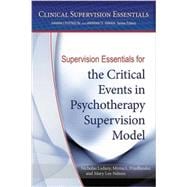Many supervisors need help navigating challenging dilemmas and conflicts that arise in supervision of trainees, such as addressing skill deficits and competency concerns, working through role conflicts, and resolving gender or ethnicity-related misunderstandings. Because these interpersonal conflicts can be so challenging, however, they often represent a golden opportunity for real progress.
This book presents a process model with specific strategies—such as exploration of feelings, focus on self-efficacy, and attention to parallel processes—that together enable supervisors and trainees to successfully resolve the problem at hand and achieve lasting success.
This book presents a process model with specific strategies—such as exploration of feelings, focus on self-efficacy, and attention to parallel processes—that together enable supervisors and trainees to successfully resolve the problem at hand and achieve lasting success.








